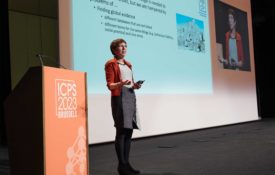-

New Content From Current Directions in Psychological Science
A sample of articles on threat-related perceptual decision making, metacognitive myopia, learning one’s own genetic susceptibility to mental disorders, brain reward circuits, and much more.
-

Want More Generous Children? Show Them Awe-inspiring Art
Research is the first to demonstrate that awe-eliciting art can spark prosociality in children as young as 8 years old, motivating them to set aside their own concerns to focus on others. Awe also has physical benefits for children.
-
Psychologist Daniel Levitin dissects Pink Floyd’s ‘Dark Side of the Moon’
LEILA FADEL, HOST: Here's an enduring legacy. Pink Floyd's album "Dark Side Of The Moon" was released 50 years ago today, and it's still on the Billboard charts. It's the longest charting album in history. (SOUNDBITE OF SONG, "BRAIN DAMAGE") PINK FLOYD: (Singing) And if the dam breaks open many years too soon, and if there is no room upon the hill. FADEL: "Dark Side Of The Moon" can be enjoyed for its far-out sonic landscapes or its inventive production. You can also study the lyrics. Much of Roger Waters' writing was inspired by a former member of Pink Floyd, Syd Barrett. He was forced to leave the band he created when his behavior became too erratic. Some say it was a psychotic break.
-
Science of forgetting: Why we’re already losing our pandemic memories
How much do you remember about the past three years of pandemic life? How much have you already forgotten? A lot has happened since the “Before Times.” Canceled proms, toilet paper shortages, nightly applause for health workers, new vaccines, waitlists for getting the first jab, and more. Covid disrupted everyone’s lives, but it was truly life-changing for only a sizable subset of people: those who lost someone to covid, health-care workers, the immunocompromised or those who developed long covid, among others. ...
-
There’s a Psychological ‘Vaccine’ against Misinformation
Misinformation can feel inescapable. Last summer a survey from the nonprofit Poynter Institute for Media Studies found that 62 percent of people regularly notice false or misleading information online. And in a 2019 poll, almost nine in 10 people admitted to having fallen for fake news. Social psychologist Sander van der Linden of the University of Cambridge studies how and why people share such information and how it can be stopped. He spoke with Mind Matters editor Daisy Yuhas to discuss this work and his new book, Foolproof: Why Misinformation Infects Our Minds and How to Build Immunity, which offers research-backed solutions to stem this spread.
-

Breakthroughs in Brussels: Researchers Share New Integrative Science at ICPS 2023
“Human behavior is at the heart of so many global challenges involving behavior change,” said Susan Michie at ICPS 2023. And at the heart of “preventing and getting out of them.”

